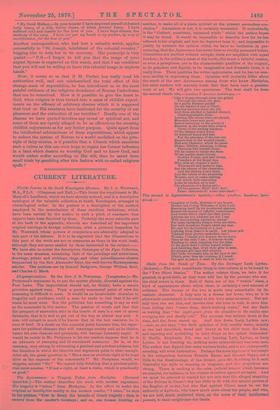The Agamemnon : a Tragedy Taken from "Eschylus. (Bernard Quaritch.)—The
author describes his work with modest vagueness. His tragedy is " taken " from 2Eschylus. In the effort to make the original an intelligible reality to the modern reader, "I came," he says In his preface, "lira to break the bounds of Greek tragedy ; then to swerve from the master's footsteps ; and so, one license drawing on .Daughter of Leda, Mistress of my house, Beware lest loving Welcome of your Lord, Measuring itself by his protracted absence, Exceed the bound of rightful compliment, And better left to other lips than yours. Address me not, address me not, I say 'With dust-adoring adulation, meeter For some barbarian Despot from his slave; Nor with invidious Purple strew my way, Fit only for the footstep of a God Lighting from Heav'n to earth. Let whose will Trample their glories underfoot, not I. Woman, I charge you, honour me no more Than as the man I am ; if honour-worth, Needing no other trapping but the fame Of the good deed I clothe myself withal ; And knowing that, of all their gifts to man, No greater gift than Self sobriety
The Gods vouchsafe him in the race of life : Which, after thus far running, It I reach The goal in peace, it shall be well for me."
another, to make all of a piece, arrived at the present anomalous con- clusion." Anomalous or not, it is certainly successful. It undoubtedly is the "distinct, consistent, animated whole" which the author hopes it may be found. It would be impossible to describe how far he has adhered to his original, and how far departed from it ; and impossible to justify by extracts the opinion which we have no hesitation in pro- nouncing, that the Agamemnon has never been so vividly presented before Obscurities are omitted without scruple, hints are amplified with equal freedom ; in the ordinary sense of the words, this is not a faithful version, or even a paraphrase, yet to the characteristic qualities of the original, to its grandeur and dignity, to its imaginative and dramatic force, it is really true. These qualities the writer appreciates, and he has no com- mon facility in expressing them. Opinions will probably differ about the merit of the new Agamemnon among those who know l'Esehylus, but other readers will scarcely doubt that they have here a genuine work of art. We will give two specimens. The first shall be from
the second chorie ode A ei 71■ ,-- I' IrrOpac
Like a dream through sleep she glided Through the silent city gate, By a guilty Hermes guided On the feather'd feet of Theft ; Leaving between those she left And those she fled to lighted Discord, /Inextinguishable Hate; Leaving him whom least she shoald, Menelaus brave and good, Scarce believing in the mutter'd Rumour, in the worse than utter'd Omen of the wailing maidens, Of the shaken hoary head: Of deserted board and bed.
For the phantom of the lad one Haunts him in the wonted places ; Hall and Chamber, which he was Hither, Thither, listening, looking, Phantom-like himself alone ; Till he comes to loathe the faces Of the marble mute Colossi, Godlike Forms, and half-divine, Founders of the Royal line, Who with all unalter'd Quiet Witness all and make no sign.
But the silence of the chambers,
And the shaken hoary head, And the voices of the mourning Women, and of ocean wailing, Over which with unavailing Arms he reaches, as to hail
The phantom of a flying sail—
All but answer, Fled ! fled! lied!
Faisal dishononed I worse than dead 1"
The second is Agamemnon's speech,—Ala, V1,10-01 614497" IP." 016g






































 Previous page
Previous page